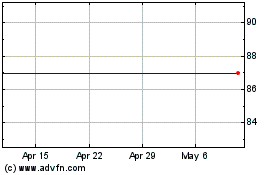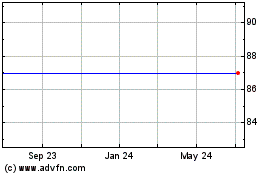By Jonathan D. Rockoff
Big drugmakers, searching for new sources of revenue, are paying
hefty premiums for biotechnology businesses, with two
multibillion-dollar acquisitions announced Monday among the latest
such deals.
Sanofi SA agreed to pay $11.6 billion in cash, a 63% premium, to
buy hemophilia-drug company Bioverativ Inc., confirming a Wall
Street Journal report Sunday.
And Celgene's cash deal to buy Juno Therapeutics Inc. values
shares in the biotech company at $9 billion, 87% more than their
worth before the Journal reported on the deal talks last week.
So far this year, the median premium paid in health-care deals
worth more than $1 billion is 89%, almost double the median of 45%
since 2010, according to Dealogic.
Both Sanofi and Celgene have been looking to add products to
cope with lower-price competition looming for their top-selling
drugs.
As big drugmakers look to deal-making, rather than their own
laboratories, to plug gaps in their product lineups, they are
increasingly willing to pay up for the scarce roster of companies
with promising products.
And analysts say premiums may only get bigger as other large
drugmakers, aided by the new tax law in the U.S., consider
acquisitions to bolster their lineups.
"Many of the largest, most cash-rich companies in the industry
have not even begun to participate in M&A, and when they do,
prices and deal volumes could step up significantly," Leerink
Partners analyst Geoffrey Porges wrote Monday in a note to
investors.
Paris-based Sanofi has already missed out on two high-valuation
deals. It lost the bidding for Medivation to Pfizer Inc., which
paid $14 billion for the cancer biotech company in 2016.
Then last year, Johnson & Johnson outbid Sanofi to buy
rare-disease drugmaker Actelion for $30 billion.
Bioverativ, of Waltham, Mass., sells two top-selling treatments
for the rare blood disorder hemophilia. The company was spun out of
big biotech Biogen Inc. last year after Biogen couldn't find any
companies willing to buy it for about $3 billion, according to a
person familiar with the matter.
Sanofi turned to Bioverativ as low-price competition drew closer
for the French company's top-selling product, Lantus insulin.
Lantus revenue has been dropping but still accounted for 13% of
Sanofi's sales during the first nine months of 2017.
Bioverativ's hemophilia drugs will fit in Sanofi's rare-disease
business and complement the company's collaboration with biotech
Alnylam Pharmaceuticals Inc. in developing a new kind of hemophilia
therapy using an emerging technology called RNA interference.
"With Bioverativ, we welcome [a] leader in the growing
hemophilia market and that will create a platform for expansion in
other rare blood disorders," Sanofi CEO Olivier Brandicourt said in
a conference call.
Sanofi said adding Bioverativ will be "immediately accretive" to
its earnings in fiscal year 2018. Yet traditional hemophilia drugs
from Bioverativ and other drug companies could see sales drop over
the long term if gene therapies now in development work out and
take over the market.
As for Celgene, the Summit, N.J., company is a major seller of
blood-cancer drugs. But competitors have been challenging the
patents protecting its top-selling product, multiple myeloma
treatment Revlimid, in their efforts to sell generic versions.
In advance of Revlimid's patent expiration, Celgene has been
entering partnerships with biotech companies working on promising
new drugs for cancer and other diseases. While waiting on the
collaborations to pan out, Celgene has added some products through
acquisitions.
Just this month Celgene agreed to pay $1.1 billion upfront for
Impact Biomedicines, a privately held cancer biotech company, and
committed to spending billions more dollars if Impact's
blood-disease drug is approved for sale and reaches other
milestones.
By acquiring Juno, Celgene will gain access to a new kind of
blood-cancer treatment, known as CAR-T, which modifies a patient's
own immune cells to turn them into potent cancer-fighting
agents.
The Juno deal "is an important step in executing our strategy to
sustain industry-leading growth by focusing on disruptive,
innovative medicines and immediately establishes Celgene as global
leader in the rapidly emerging field of cellular immunotherapy,"
Celgene CEO Mark Alles said in a conference call with analysts and
investors.
Celgene said the Juno acquisition won't become "incrementally
additive to net product sales" until 2020. It also predicts that
Juno's most-advanced drug, JCAR017, will peak at $3 billion in
yearly world-wide sales.
But some industry officials and advisers question how lucrative
the drugs will be unless they can be used beyond blood cancers and
don't have to be tailored to each individual patient.
Celgene's valuation of Juno was influenced by Gilead Sciences
Inc.'s $11 billion acquisition of Kite Pharma, which also has a
CAR-T treatment. Gilead said it paid a 50% premium to the 30-day
volume-weighted average of Kite's stock price.
Celgene executives said on a conference call with investors that
the company will continue looking for acquisitions.
--Cara Lombardo contributed to this article.
Write to Jonathan D. Rockoff at Jonathan.Rockoff@wsj.com
(END) Dow Jones Newswires
January 22, 2018 19:45 ET (00:45 GMT)
Copyright (c) 2018 Dow Jones & Company, Inc.
JUNO THERAPEUTICS, INC. (NASDAQ:JUNO)
Historical Stock Chart
From Oct 2024 to Nov 2024

JUNO THERAPEUTICS, INC. (NASDAQ:JUNO)
Historical Stock Chart
From Nov 2023 to Nov 2024
